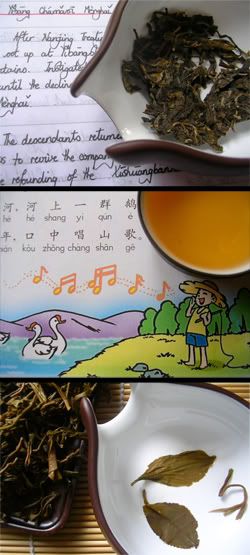 This is a shengpu bing from the Menghai region, created by the Yibang Chamasi [CHA-MA-SIR] factory, and is sold by Royal Puer for a trifling £5 [$10]. The following information regarding the factory comes courtesy of Tehalia:
This is a shengpu bing from the Menghai region, created by the Yibang Chamasi [CHA-MA-SIR] factory, and is sold by Royal Puer for a trifling £5 [$10]. The following information regarding the factory comes courtesy of Tehalia:Shortly after the Nanjing Treaty of 1842, the Qing court set up the Chamasi bureau in the region of Yibangshan, the tallest of the six great mountains and the centre of the region's tea industry at that time. It controlled collection, production, and distribution (particularly to the Imperial family) until the decline of the 1890s, when production moved to Menghai.
The descendants of the family responsible for the Chamasi bureau apparently returned from Indonesia to China in the 1970s with the aim of reviving their ancestor's organisation. Three major shareholders joined for the refounding of what became the Xishuangbanna Yibang Chamasi Company in 2005.
I notice from the product web-site that VL found this tea to be "a bit peculiar".
Brita-filtered water @ 100C in 12cl shengpu pot; ~6-7g leaf; 1 rinse
 Dry leaf:
Dry leaf:It looks rather nice, in fact: dark, small leaves with some tips, and plenty of fur throughout. It has a sweet, highly typical mushroom aroma that I have come to associate with Menghai-region leaves. First impressions are favourable, at least.
3s, 4s, 5s, 6s:
Light yellow soup, made cloudy by the fur that we noted on the dry leaves. It has a gentle, sweet aroma in the wenxiangbei which is really little more than warm air.
The flavour is a touch thin, but what there is hits the "sweet mushroom" category with little equivocation. The ku hovers just off-stage, for now - identifiably present, yet kept at bay by the very brief infusion.
It isn't a good tea, but it isn't explicitly bad in any regard: given that it lies soundly within the "very cheap" league, it manages to avoid all of the usual pitfalls that other in its class usually fall into (roughness, sharpness, astringency, poor production).
The feeling in the mouth is fairly neutral, but there is a fair and gentle huigan awaiting the patient.
This tea is bright with a heavy payload of caffeine, which hits me directly between the eyes. It really is very strong in that regard.
Wet leaf:
The lower grade becomes obvious as we turn out the leaves into the chahe: generally small, but quite chopped with more than a few stems. It could almost be Xiaguan, or Chen Guanghe Tang. However, unlike those teas, this is a cheap tea, and the low grade is anticipated.
Overall:
A fair enough tea, which does not offend or fault in any real fashion: it is gentle, sweet, and quite timid in flavour (packing a hefty amount of caffeine). However, when we then take its highly inexpensive price into account, its lack of faults might make it tempting.
Given that a cake of this fair if uninspiring tea costs less than two hideous coffees from Starbucks (or those of its ilk), it's not a bad little tea. Certainly not peculiar, to my tastes at least.
I won't be buying any of this particular tea for myself, but I look forward to trying the more expensive (£10) Gedebao bing from the same company, recommended by Geraldo.

2 comments:
I can't remember much about tasting this tea. But peculiar? I think I was just saying this tea isn't very good. I'll try and dig up my sample to taste sometime, bits of it are still somewhere...
-vl.
I can imagine why this one might slip from the mind - it's not exactly memorable - but, at the same time, it's a fair tea. I look forward to hearing your thoughts!
Toodlepip,
Hobbes
Post a Comment